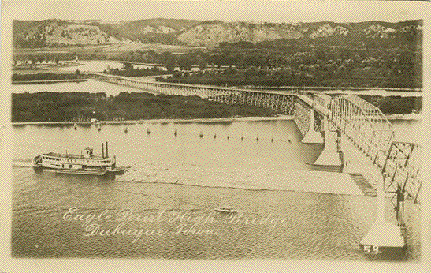Encyclopedia Dubuque
"Encyclopedia Dubuque is the online authority for all things Dubuque, written by the people who know the city best.”
Marshall Cohen—researcher and producer, CNN
Affiliated with the Local History Network of the State Historical Society of Iowa, and the Iowa Museum Association.
LOG RAFTS
LOG RAFTS. Picturesque method of transporting timber to mills along the MISSISSIPPI RIVER. Logs, cut during the winter months in northern forests, were branded with the owner's sign and stacked along the riverbanks to await the spring thaw. Once in the river, the logs were assembled into rafts and guided by men using "sweeps."
The first rafts arrived in St. Louis, Missouri, in 1840 with an estimated eight hundred thousand feet of lumber. Late in the 1800s, as many as seven hundred rafts, headed for other mills, passed Dubuque annually while untold more ended up at Dubuque.
Raft boats were later used to push the rafts to the mills. Using a crew of eighteen, a raft boat could guide a raft containing as much as three million feet of lumber, an amount roughly equal to seven trains of fifty cars each.
The largest log raft on the Mississippi was formed at Lynxville in 1896. It was 270 feet wide and 1,550 feet long. It contained 2.25 million board feet of lumber. (1)
---
Source:
1. Wisconsin Historical Markers. Online: http://wisconsinhistoricalmarkers.blogspot.com/2013/07/marker-149-rafting-on-mississippi.html
See: RAFTING.




